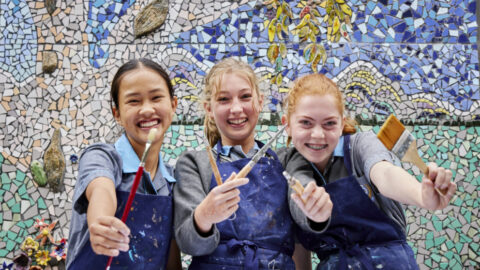Barbie: Girl Culture

I went and watched Barbie last week.
Unless you have been living on the moon, and that probably wouldn’t be far enough away to escape the massive marketing blitz that has been everywhere promoting this huge movie, you know exactly what I am referring to.
Barbie is of course, the smash-hit movie starring Australia’s Margot Robbie. It is a fabulous spectacle complete with nostalgic delights along with numerous iconic nods for film enthusiasts all wrapped in a feminist’s lens on possibly, the most famous toy in the world.
Prior to going to see the movie, and even while I was watching it, I wondered whether this was an insightful, nuanced commentary on gender and how we perceive it in the world, or was this film just a really clever device to sell more product to an insatiable market eager to spend big for the latest wave of popular culture?
I admit, one reason for seeing the film was to be familiar with current popular culture. I figure that many of our students would be going along, so I should have some inside knowledge of what they will be talking about at School. For the same reason, if I could get tickets to Taylor Swift I would happily go to her concert. Harry Styles though, I think I would pass! There is a limit to one’s research of teenage popular culture.
Barbie has excited strong emotions notably in the US conservative media. Commentator and personality Ben Shapiro denounces the movie as “woke, feminist dreck!” His contempt for the movie is palpable. Other media commentators have a different view. Jacqueline Maley writing in the Sunday Age argues that Barbie is an example of the great flowering of Girl Culture which we are witnessing at the moment.
The obvious example of this currently is the FIFA Women’s World Cup being played in Australia and the buzz around our own team, the Matildas. It is not just that expectations are high for the Matildas to advance deep into the Tournament, but the sheer size of the support not only at the matches but in the media as well.
Sam Kerr, arguably the best player in the world and Australia’s Captain, and the entire Team, have captured the imagination of the country. Australia’s Prime Minister Anthony Albanese has suggested he will declare a public holiday if the Matildas win. The television coverage of the Australia versus Canada game last week was the highest rating program on Chanel 7 this year with a total reach of 4.7 million viewers, comprehensively beating the coverage of the Ashes Men’s Cricket. Going back only a couple of years, women’s soccer was relatively unnoticed to all but those close to the sport.
While the FIFA World Cup is dominating the media at the moment, other notable female achievements in sport have also been occurring. The Australian Women’s Cricket Team won the Ashes recently, our Swimming Team dominated the World Championships where the stunning exploits of the women reaped a golden harvest in the pool and just this week, the Australian Netball Team, the Diamonds, won the Netball World Cup. The Diamond’s World Cup win adds to their trophy cabinet where they have won every major netball championship possible over the last couple of years.
Sport is not the only sphere where Girl Culture is spreading. Barbie was produced, written, and directed by women. Women are increasingly represented at the highest levels not only in sport but in the arts, education, commerce, and public office. Most notably, past student Her Excellency the Honourable Justice Linda Dessau AC CVO, and her term as Victoria’s Governor is but one example from our own St Catherine’s community.
Barbie is a movie which moves the viewer beyond ‘Barbie Land’ and all its perceived perfectness. The real world is very different as Margot Robbie’s character Stereotype Barbie, finds out. There is a greater and more painful truth of being a woman in 2023.
One of the significant characters in the movie, Gloria, who is a Mattel employee and mother, delivers a monologue about modern womanhood when she is trying to console Margot Robbie’s Barbie, who is in the throes of her own existential crisis after the Kens turn Barbie Land into a patriarchy. It is the defining moment in the film. It is too long to include the whole speech in this piece, but the following quote resonates.
“It is literally impossible to be a woman. You are so beautiful, and so smart, and it kills me that you don’t think you’re good enough. Like, we have to always be extraordinary, but somehow, we’re always doing it wrong.”
Whenever I walk through our School campus and talk with our students, I see enthusiasm, optimism, and a sparkle in their eyes. By attending St Catherine’s, our students are not limited by their gender in what they aspire to be or what they can achieve. They are supported, encouraged, and even emboldened to have great aspirations.
Barbie is a fun yet thoughtful film and to all you Barbie fans out there, take your husband, brother, and male friends along to see it, even if they don’t want to. As the marketing says, this is a film for those who love Barbie and a film for those who hate Barbie. I guarantee it will generate an interesting conversation afterwards.


